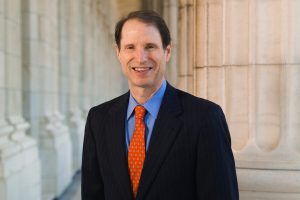Senator Behind Internet-Enabling Legal Loophole Says Loophole is in Jeopardy
 WASHINGTON – In an opinion piece published on TechCrunch.com, Sen. Ron Wyden, one of the chief architects of the safe harbor provisions delineated under Section 230 of the Communications Decency Act, frets that corporate complacency about “indecent” materials posted on major social media platforms may threaten the continued viability of that safe harbor.
WASHINGTON – In an opinion piece published on TechCrunch.com, Sen. Ron Wyden, one of the chief architects of the safe harbor provisions delineated under Section 230 of the Communications Decency Act, frets that corporate complacency about “indecent” materials posted on major social media platforms may threaten the continued viability of that safe harbor.
The sort of indecency Wyden is concerned about has nothing to do with pornography, however, as his article makes extremely clear.
“The goal (of Section 230) was to protect the unique ability of the internet to be the proverbial marketplace of ideas while ensuring that mainstream sites could reflect the ethics of society as a whole,” Wyden writes, and that in general, “this has been a success – with one glaring exception.”
“I never expected that internet CEOs would fail to understand one simple principle: that an individual endorsing (or denying) the extermination of millions of people, or attacking the victims of horrific crimes or the parents of murdered children, is far more indecent than an individual posting pornography,” Wyden adds.
Make no mistake, though – Wyden isn’t advocating for social media spaces or other websites to become free-for-all forums with respect to sexually-explicit materials.
“If you want to be the CEO of an internet titan where schools communicate with students, artists with their fans or elected officials with their constituents, you need to limit content like pornography – and they all do,” Wyden observes. “But for some reason, these CEOs think it’s entirely appropriate to allow these other forms of indecency to live on their platforms. Their ineptitude is threatening the very legal foundation of social media.”
As Wyden notes, the protection afforded to websites under Section 230 “is not constitutional, it’s statutory.” What he means by this is what Congress has given, Congress can also take away – and the harder it becomes for people like Wyden to defend the Section 230 safe harbor from its many critics, the more likely it is Congress will do exactly that.
“Failure by the companies to properly understand the premise of the law is the beginning of the end of the protections it provides,” Wyden asserts. “I say this because their failures are making it increasingly difficult for me to protect Section 230 in Congress. Members across the spectrum, including far-right House and Senate leaders, are agitating for government regulation of internet platforms. Even if government doesn’t take the dangerous step of regulating speech, just eliminating the 230 protections is enough to have a dramatic, chilling effect on expression across the internet.”
Whatever one may think of Wyden’s opinion on the type of speech he’s addressing in this column, his warning about Section 230 is something we should all heed. Congress has already carved out a significant – and some would say troubling – exception to Section 230, in the form of the Allow States and Victims to Fight Online Sex Trafficking Act (“FOSTA”).
As the plaintiffs in the Woodhull Foundation note in their lawsuit challenging the constitutionality of FOSTA, “FOSTA’s carve-out to Section 230 creates a content-based exception that promotes over-censorship, and creates incentives for a heckler’s veto.” At the same time, the same plaintiffs “agree that Congress may amend Section 230,” even if they take the position that FOSTA does so in a way which violates the First Amendment.
As Wyden observes, the stakes here couldn’t be higher for websites built on user-generated content, as all the major social media platforms are.
“Were Twitter to lose the protections I wrote into law, within 24 hours its potential liabilities would be many multiples of its assets and its stock would be worthless,” Wyden writes. “The same for Facebook and any other social media site. Boards of directors should have taken action long before now against CEOs who refuse to recognize this threat to their business.”
Even if you think the above is hyperbole, it’s hard to deny the protection of Section 230 has been crucial to the development of the internet as we know it. The fact that one of the authors of that safe harbor is now openly and publicly worrying about its future viability suggests the rest of us ought to be concerned, as well.













